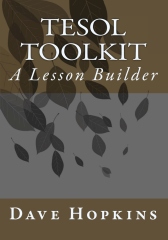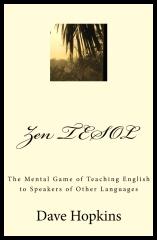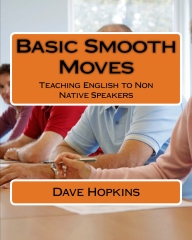
Late
Autumn 2011
Training
Trainers
by David
Hopkins
Post-
Secondary
Outcomes
for
Latinos
by
Robb
Scott, Ed.D.
Expanding
the Goals
of
ESOL
by
Alvino
Fantini,
Ph.D.
![]()
/Index/
/Letters/
/Profiles/
/Search/
/Podcasts/
![]()
Subscribe
for free!



Planting the Seeds for Lifelong ESL Teacher Development
A Call to Improve Short-Term Teacher Training Programs
David Hopkins has taught English, trained teachers, developed curriculum, and led projects in Peru, Brazil, the United States, Egypt, Thailand, Japan, and Pakistan.
This article is an introduction and an invitation to participate in a discussion and eventual publication of views on the preparation of teacher trainers in short term TESOL courses. Here's what the blog "Training ELTeachers" says about the book resources available. “Books specifically for teacher trainers are few and far between. There’s probably a good reason for this. It’s a niche market as far as publishers are concerned and then there’s the issue of who/where/what/why are you training which means writing a book to help every context is even more complex than trying to write a course book that will serve everyone.” There is one book available from Cambridge, Teacher Training Essentials. I have just purchased the book and so have no reflections as yet, but from the description, “This book of ready-to-use teacher training workshops is designed to provide a bank of perfectly planned and structured sessions with accompanying photocopiable worksheets. The sessions develop trainees' and teachers' knowledge of three key areas: methodology, language and theory, and encourage them to actively reflect on their own prior learning and experience. These workshops are ideal for in-house and in-service teacher training as well as preparation for awards such as CELTA, DELTA, Trinity CertTESOL and Trinity LTCL Diploma TESOL.” Here's what I have in mind. An edited collection of essays grouped under the following headings. Of course the whole endeavor requires contributions from significant people. I think that you might assist in this regard. Which raises the next point...what are the criteria? Submissions should be: What's the rationale? Jack Richards wrote a book called Beyond Training in which he elaborated how he progressed from the "procedural and managerial aspects of teaching,...to the beliefs, knowledge and thinking that underlie their successful use." (Richards, 1998) I would suggest that "effective teaching practices and competencies" should not be divorced from the principles on which they are founded. The perspective that "trained" teachers are merely journeymen and women, who apply techniques, misses the point that all teachers base what they do on their own beliefs. It is important to connect the ideas and the actions at the earliest possible stages. Equally important, is the fact that there is hardly time or resources to meet the extended academic requirements of, Second Language Teacher Education (SLTE) in Masters programs. The need for focused, short-term teacher training in English language learning is critical. I would propose that the type of training courses referred to as TESOL certificate training is not only relevant, but also paramount at this juncture in history. The "global village" relies on English as a means of communication far beyond the resources available to provide meaningful instruction. Furthermore, most teachers of English, This is true for ESL where English is taught in an English speaking environment; in multilingual societies where English is the "international" language; and, in international settings where English is taught as a language for business, travel and computer mediated communication. This is an argument for improving the effectiveness of short-term TESOL training courses for both native and non-native speakers of English. While the value of TESOL certificate training courses is recognized, the outcomes and effectiveness of these courses are not measured consistently, and the credibility of this training suffers accordingly. As well, the connection to longer term “teacher development“ is usually overlooked. By focusing on the preparation of the trainers, this book provides the means by which these training courses might be made more effective, and extended to meet the needs of teacher development. Writing and publishing a book is not enough. However, it does draw attention to the salient issues that need to be addressed. That is the intention of Training Trainers; Teacher Training. What do you think?
2011 ESL MiniConference Online
PDF conversion by PDF Online
![]() He is currently adding Saudi Arabia to that list. Professor Hopkins is using the following article to prompt discussion among teacher trainers regarding what is most essential to include in short-term ESL teacher training programs. He has contacted a publisher and is very interested in hearing from anyone who would like to join this project. Dave's e-mail is davehbanphe@gmail.com. Please read his article, below, and be inspired.
He is currently adding Saudi Arabia to that list. Professor Hopkins is using the following article to prompt discussion among teacher trainers regarding what is most essential to include in short-term ESL teacher training programs. He has contacted a publisher and is very interested in hearing from anyone who would like to join this project. Dave's e-mail is davehbanphe@gmail.com. Please read his article, below, and be inspired.
Article by David Hopkins
Contact info for David Hopkins:
davehbanphe@gmail.com